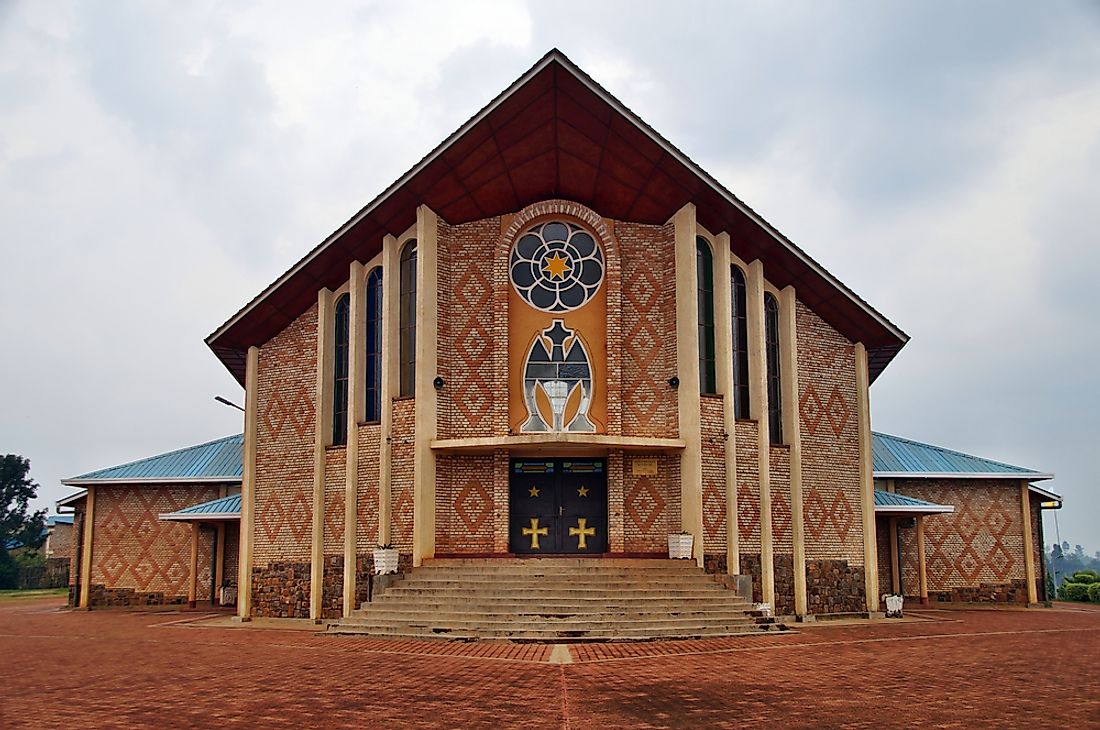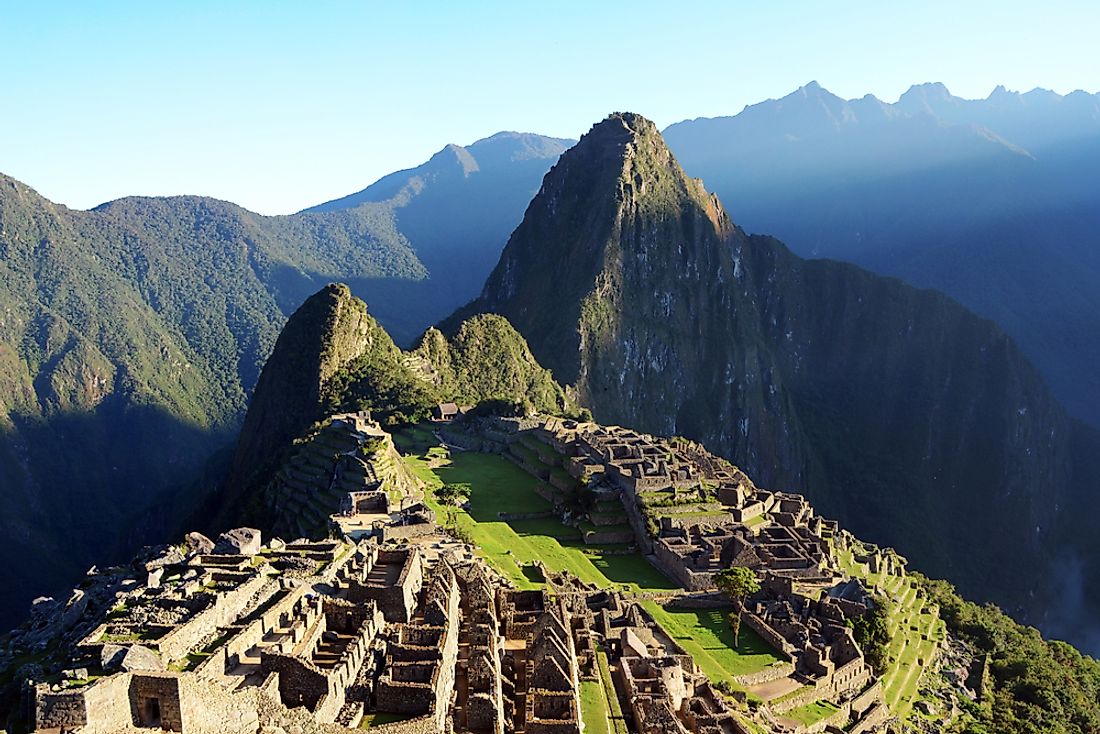Most Religious Countries In The World

Although it may seem like the world is becoming less and less religious with every passing generation in the era of globalization, statistics reveal that this may actually not at all be the case. According to the WIN/Gallup International Poll, the most cited study on religious involvement worldwide, there are many countries worldwide where at least 90% of residents identify as being religious. In our list below, we provide an overview of the countries topping this list. It is interesting to note that the world's most religious countries do not adhere to one religion in particular, but instead represented a diverse set of religious beliefs.
5. 95% Religious - Algeria, Chad, Ghana, Mali, Qatar, Republic of the Congo, Rwanda, and Zambia

Most of the countries where 95% of the population of identify as religious are found in Africa. They are Algeria, Chad, Ghana, Mali, Republic of the Congo, Rwanda, and Zambia. Qatar, in the Persian Gulf region, also makes this list.
99% of the population of the North African country of Algeria identifies as Muslim. Islam is very influential in Algerian society.
In Chad, around half of the population is Muslim. The remainder of the population is Christian (both Catholic and Protestant), Animist, or Atheist. The constitution of the country calls for religious freedom.
Most Ghanian citizens are Christian. Pentecostal Christians are the most common type of Christians found in Ghana. Ghana is known for having a very high degree of religious tolerance.
Islam is the most popular religion in Mali. The remainder of the population is mostly Christian.
Although most people in Qatar are Muslim, there are other religions practiced in the country. The second most popular religion is Christianity, which is closely followed by Hinduism and Buddhism. However, the state religion is officially Islam.
95% of people living in the Republic of the Congo claim to be religious. Christianity is most common in the country, with Catholics, Awakening Lutherans, and Protestants all represented. The country is home to a small minority population of Muslims.
Catholics are the most represented denomination in the small country of Rwanda. Protestants make up the second largest religious population in the country.
Zambia is officially a Christian country, as its constitution states it is the official religion. However, the consitution also protects the rights of citizens to practice whichever religion they would like.
4. 96% Religious - Cambodia, Cameroon, Jordan, Malaysia, Nigeria, Philippines, Senegal

Citizens of Cambodia, Cameroon, Jordan, Malaysia, Nigeria, the Philippines, and Senegal identify as being 96% religious.
The official religion of Cambodia is Buddhism. However, Islam is the most popular religion for certain minority populations such as the Cham and Malay. There are also approximately 20,000 Catholics in Cambodia.
There are three religions in Cameroon to which the majority of the population adheres: Christianity, Islam, and Traditional African religion. In Cameroon, Christians are divided linguistically, with the majority of Anglophones being Protestant and the majority of Francophones being Catholic.
In the Middle Eastern country of Jordan, the majority of the population is Sunni Islam. 96% of the population identifies as such. The remaining 4% identify as Christian.
The official religion of Malaysia is Islam. However, the country is multicultural and is therefore home to a variety of religious beliefs. The country is unique for designating holidays from various religions as national holidays.
Nigeria is a religious country, with 96% of the population identifying as religious. The country's population is evenly divided between Islam and Christianity. Most Nigerian Christians are Protestant.
The population of the Philippines is overwhelming Roman Catholic, with estimates resting at around 80%. The Catholic church is very influential in the culture of the country.
The majority of Senegalese are Muslim. Islam is practiced by 92% of the population of Senegal. The country has a minority Christian population, and is known for being religiously tolerant.
3. 97% Religious - Afghanistan, Comoros, Egypt, Guinea, Laos, Morocco, Myanmar, Thailand

97% of the population of the following countries identify as religious: Afghanistan, Comoros, Egypt, Laos, Morocco, Myanmar, Thailand.
Around 90% of residents of Afghanistan follow Sunni Islam. The remaining percentage of the population identifies as Shia Muslim. The religion of Zoroastrianism is thought to have its roots in Afghanistan. Today, around 2,000 Zoroastrians exist in Afghanistan. Small populations identifying as Christian, Bahá'i, and Buddhists also exist in Afghanistan.
The state religion of Comoros is Islam. Nearly 98% of the population follow Islam. In the small island country, converting from Islam is a crime. The government has been accused of discouraging the practice of other religions.
In Egypt, religion plays a big part in the daily social life of its residents. The country is predominantly Muslim, with the number hovering around 90%. The remaining 10% of the population mostly belongs to the Coptic Orthodox Church of Alexandria. There are also small populations of people who are neither Muslim nor Coptic Christian.
Most people in Laos follow Buddhism (Theravada Buddhism in particular). Other religions followed include Laotian folk religion and Christianity.
Islam is the official state religion of Morocco. Most of the Muslims in Morocco are Sunni. It has been noted in recent years that the population of those who do not adhere to a certain religion is growing. However, measuring such a statistic is difficult as many of those who are atheist or agnostic may prefer to remain silent.
There is no state religion in the country of Myanmar. However, Buddhism is the most popular religion in the country by a landslide. Christians, however, make up the fastest-growing religious group in the country.
Thailand, as well, does not have an official state religion. The King of Thailand, however, is required to practice Buddhism. Populations of Hindus, Muslims, Christians, and those who practice folk religions also exist. A small number of Sikhs also exist in Thailand.
2. 98% Religious - Burundi, Djibouti, Mauritania, Somalia

The countries of Burundi, Djibouti, Mauritania, and Somalia all have populations who consider themselves to be very religious. In fact, 98% of citizens of these aforementioned countries consider themselves to be religious.
In Burundi, around 86% of people identify as Christian. The country is also home to the highest percentages of Catholics in Africa. Some Catholic holidays are public holidays in the country.
In Djibouti, 94% of people consider themselves Muslims, and 6% identify as Christians.
Mauritania is nearly 100% Muslim. The country has been criticized for its lack of religious freedom. In Mauritania, atheism is punishable by death.
The religion of the majority in Somalia is Islam, although there is a small Christian minority as well as a small minority who practice traditional faiths.
1. 99% Religious - Bangladesh, Ethiopia, Indonesia, Malawi, Niger, Sri Lanka, Yemen

The world's most religious country is actually a 7 way tie between Bangladesh, Ethiopia, Indonesia, Malawi, Niger, Sri Lanka, and Yemen.
Islam plays an important role in the daily lives of the Muslims of Bangladesh (about 88% of Bangladesh’s population). Islam is also the official religion of this country, which has one of the largest Muslim communities in the world. Muslim festivals are celebrated with great pomp and festivity throughout the region.
In Ethiopia, there is not one official religion, but instead a number of religions practiced. The most popular of these is the Ethiopian Orthodox faith, with 43.5% of the country's population adhering to it. Other religions in the country include Protestant Christians, Catholicism, Islam, and traditional beliefs.
Islam is the most popular religion in Indonesia, with 87.2% of the population practicing it. The Constitution of the country guarantees the freedom to practice one's own religion. The international spiritual movement called Subud was founded in Indonesia.
The majority of the population of Malawi identifies as Christian. There is also a notable Muslim population.
99% of the citizens of Niger consider themselves to be religious. Islam is the religion for the majority of the residents of Niger, with 94% of the population following this religion. The majority of Niger’s Muslims are Sunnis practicing the Maliki school of jurisprudence. Animism, Christianity, Hinduism, Baha’ism, and some traditional African religions are some of the other minority religions practiced in the country.
Sri Lanka is a multi-religious society. Though Buddhism is the major religion, other religions, such as Hinduism, Christianity, and Islam, are also commonly followed there. Buddhism had played a very significant role in shaping the history of the country, and continues to influence the ethical and philosophical aspects of the Sinhalese culture. Overall, the population of Sri Lanka is highly religious, with 99% claiming that religion plays an important role in their daily lives.
Even though the followers of the different schools of Islam occupy separate territories in Yemen, Islam unifies the Yemenis across all boundaries in the country. The Yemenis strictly adhere to the five tenets of Islam. Men gather together at the mosques for prayers and, on the Sabbath, for sermons, while women are strictly prohibited from entering these public places of worship. All of the major festivals on the Arab Muslim calendar are observed by the Yemenis.
The World's Most Religious Countries
| Rank | Country | Population Who Identifies As Religious (%) |
|---|---|---|
| 1 | Bangladesh | 99 |
| 2 | Ethiopia | 99 |
| 3 | Indonesia | 99 |
| 4 | Malawi | 99 |
| 5 | Niger | 99 |
| 6 | Sri Lanka | 99 |
| 7 | Yemen | 99 |
| 8 | Burundi | 98 |
| 9 | Djibouti | 98 |
| 10 | Mauritania | 98 |
| 11 | Somalia | 98 |
| 12 | Afghanistan | 97 |
| 13 | Comoros | 97 |
| 14 | Egypt | 97 |
| 15 | Guinea | 97 |
| 16 | Laos | 97 |
| 17 | Morocco | 97 |
| 18 | Myanmar | 97 |
| 19 | Thailand | 97 |
| 20 | Cambodia | 96 |
| 21 | Cameroon | 96 |
| 22 | Jordan | 96 |
| 23 | Malaysia | 96 |
| 24 | Nigeria | 96 |
| 25 | Philippines | 96 |
| 26 | Senegal | 96 |
| 27 | Algeria | 95 |
| 28 | Chad | 95 |
| 29 | Ghana | 95 |
| 30 | Mali | 95 |
| 31 | Qatar | 95 |
| 32 | Republic of the Congo | 95 |
| 33 | Rwanda | 95 |
| 34 | Zambia | 95 |
| 35 | Bahrain | 94 |
| 36 | Central African Republic | 94 |
| 37 | Democratic Republic of the Congo | 94 |
| 38 | Kenya | 94 |
| 39 | Liberia | 94 |
| 40 | Benin | 93 |
| 41 | Madagascar | 93 |
| 42 | Nepal | 93 |
| 43 | Saudi Arabia | 93 |
| 44 | State of Palestine | 93 |
| 45 | Sudan | 93 |
| 46 | Tunisia | 93 |
| 47 | Uganda | 93 |
| 48 | Namibia | 92 |
| 49 | Pakistan | 92 |
| 50 | Paraguay | 92 |
| 51 | Trinidad and Tobago | 92 |
| 52 | Kuwait | 91 |
| 53 | United Arab Emirates | 91 |
| 54 | India | 90 |
| 55 | Kosovo | 90 |







